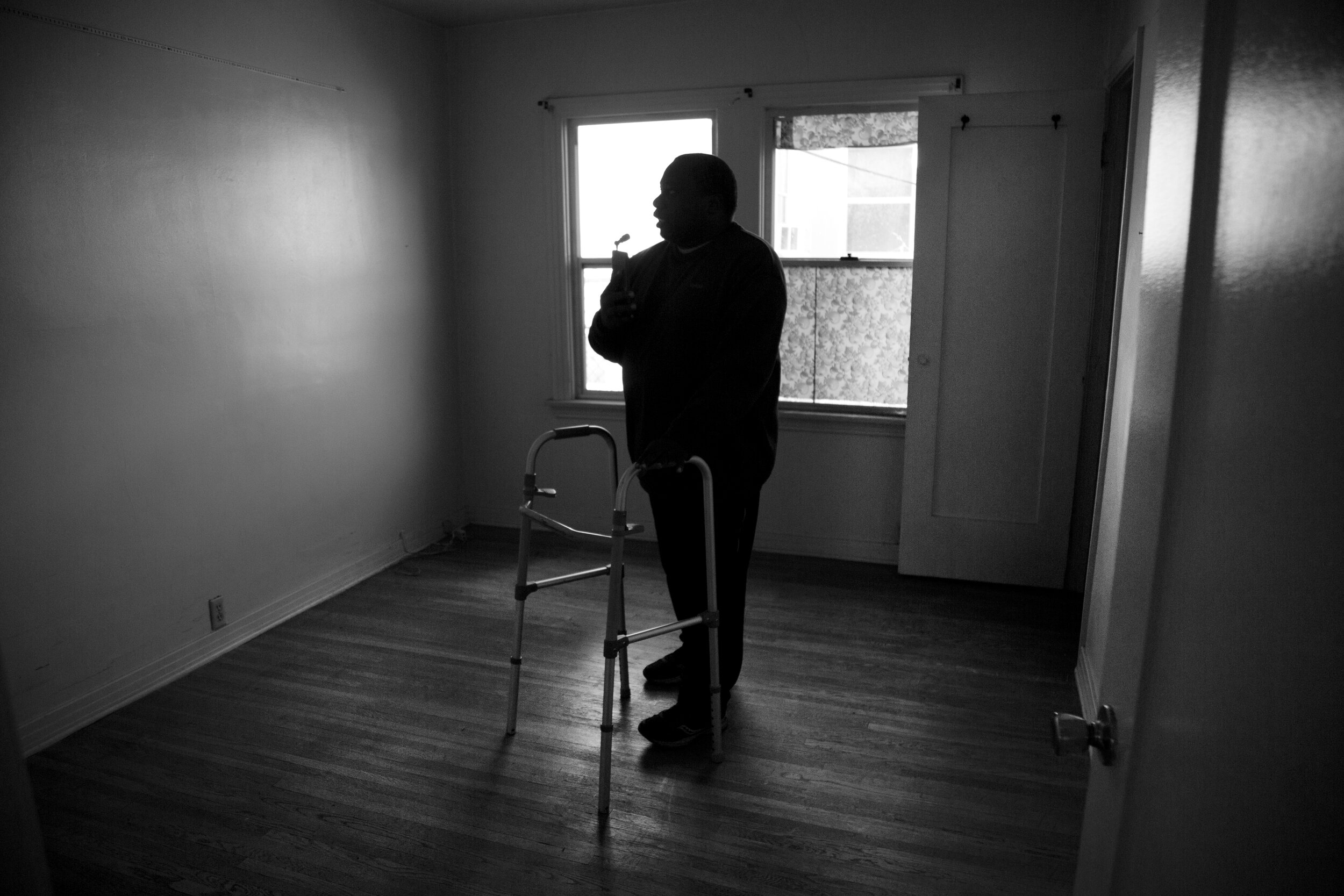unity through art
By Baraa Alkassir and Alyssa Durant
Unhoused activist and podcaster Theodore Henderson speaks with participants at a “home reclamation” protest in
Los Angeles.
Photo by Shae Hammond
As gentrification is on the rise, there are bands of activists who seek solutions to the ongoing crisis.
“Homelessness is not solved when you hand a meal to someone or give them shelter,” said Ernie Perez, a musician and homelessness activist. “For them, it is only a crack of light. They need respect and dignity. Homelessness ends when we give people their dignity back.”
Visit AUEH on Instagram
Perez co-founded a local activism group called Artists United to End Homelessness with two other advocates named Lee Ballinger and Carvell Holloway, who met through the music industry decades ago.
“Music to me saved my life,” Holloway said. “What being an artist and playing an instrument does is it connects you with some other people, like-minded people. To me, Artists United is about like-mindedness.” Holloway is the director of music education at Davis Middle School in Compton. He has been teaching in Compton for around 15 years.
For the longtime friends, the housing crisis is a direct result of society’s perception of the unhoused community as second class citizens whose bad decisions led to their unfortunate lives.
“Most people see them as second class citizens,” said Ballinger, a writer and spoken-word poet. “The enemies of the cause have won the battle in convincing people that they are second class citizens.”
Photo by Shae Hammond
According to The Council of Economic Advisers’ 2019 report titled “The State of Homelessness in America,” homelessness is a problem that is created not as result of the laziness or drug addiction of the homeless but rather by “stringent housing market regulation” that directly contribute to homelessness in major metropolitan areas around the United States.
In the same study, researchers found that homelessness could be cut in half in all United States’ major cities in which a lot of the homeless live if housing prices were simply deregulated which effectively makes it easier to build legal shelters by subsidizing housing in a specific area.
The Artists United Founders believe that the false image and perception about the reasons of homelessness can be changed through art
“Art evokes feelings,” said co-founder Perez. “Storytelling uses the abstract ability to motivate and evoke emotions. The artist has the ability to make you want to look at something tragic or even repulsive and make it digestible in the form of art.”
Artists United To End Homelessness plans to host an online music, poetry, art, and photography show in the near future. A conference call will be held on May 19 to discuss the specifics of the event. If you would be interested in participating, contact contactaueh@gmail.com.
“Take the people without houses and put them in the houses without people.”
Theodore Henderson narrates an episode of his podcast, in the midst of a house reclamation protest in Los Angeles. Photo by Shae Hammond
Photo by Baraa Alkassir
Another gifted Angeleno who is a fervent believer in the power of art (specifically the art
of storytelling) is Theodore Henderson
Henderson is a Los Angeles resident currently experiencing homelessness that resides in a park in Chinatown, and produces podcasts off his phone. He conducts powerful interviews with other homeless people in his “We The Unhoused” episodes, because he knows how to talk to them, compared to the media who only talks about, and down to them.
His communication skills curate an impactful, artistic approach to expressing knowledge and wisdom. “When people heard their voices on the podcast it gave them the confidence to stand up for themselves,” said Henderson. “People talk at the unhoused and not to them.” Henderson’s podcast has not only attracted homeless listeners and those who advocate for their rights, it has also attracted the attention of many, including the likes of the Los Angeles Times and BBC.
“How many people did we write off because they were homeless?” said Henderson. “People passed by me without knowing I could do a podcast. They would try to kick me out of the park or something but they never really stopped to get to know me.” Henderson emphasized the importance of the unhoused to be recognized in society. The larger housed community needs to do a lot of work to dismantle and call out the media and people who depict the homeless in a negative light. A big part of the solution, he argues, is the engagement of the housed community.





